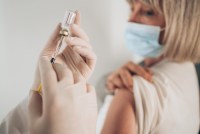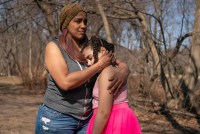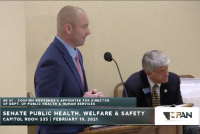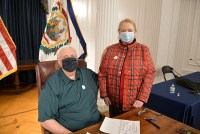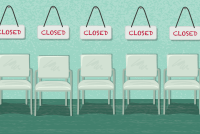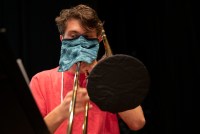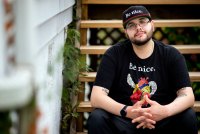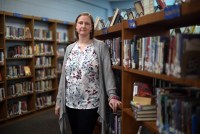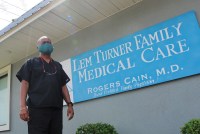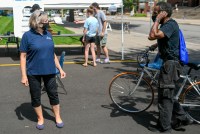Brecha de género contra covid: se vacunan más mujeres que hombres
Porque representan gran parte de la fuerza laboral en atención médica y educación, porque viven más o porque son más proactivas, las mujeres tienen tasas más altas de vacunación contra covid.
The Gender Vaccine Gap: More Women Than Men Are Getting Covid Shots
A KHN examination of state vaccine statistics shows that more women than men have gotten covid vaccines. Experts cite demographic realities of those who were part of the initial rollout but also women’s greater likelihood to seek preventive health care.
Condados más ricos del país, abrumados por el aumento del hambre infantil
Los incrementos más pronunciados se registran en algunos de los condados más adinerados, donde la riqueza general oscurece las frágiles finanzas de los trabajadores con salarios bajos.
Need Amid Plenty: Richest US Counties Are Overwhelmed by Surge in Child Hunger
Hunger among kids is skyrocketing, even in America’s wealthiest counties. But given the nation’s highly uneven charitable food system, affluent communities have been far less ready for the unprecedented crisis than places accustomed to dealing with poverty and hardship.
For Spring Season, Young Athletes Get Back in the Game Despite Covid Risk
With schools opening up classrooms, millions of young athletes are also getting out on fields and courts. But pandemic precautions and delays are spurring conflicts among parents, coaches and doctors.
Looking to Kentucky’s Past to Understand Montana Health Nominee’s Future
Montana’s pick for health director has garnered both praise and criticism for his past in Kentucky, where he sought to add work requirements to the state’s Medicaid program and was a top health official amid a hepatitis A outbreak.
Schools Walk the Tightrope Between Ideal Safety and the Reality of Covid
Across the country, politics have muddied the question of when and how to reopen schools. Even though teachers continue to fear for their safety, lawmakers and parents are demanding that schools take advantage of declining infection rates to open safely and quickly.
‘We’re Not Controlling It in Our Schools’: Covid Safety Lapses Abound Across US
As President Biden calls for more support to help schools hold in-person classes, public health experts say schools can be relatively safe if they take well-known steps to prevent covid. But a KHN investigation shows many districts and states have ignored health advice or written their own questionable safety rules for schools.
Mientras los vulnerables esperan, cónyuges de políticos reciben la vacuna contra covid
Los políticos que recibieron la vacuna junto con sus cónyuges dijeron que querían dar el ejemplo y generar confianza. Pero algunos cuestionan esta razón.
As the Vulnerable Wait, Some Political Leaders’ Spouses Get Covid Vaccines
Spouses of governors and federal leaders are getting early access to scarce doses of covid-19 vaccines. Some officials have argued their inoculation sets an example for the public and shows the vaccines to be safe and effective. But critics say those doses should go to more vulnerable people first.
Children’s Hospitals Are Partly to Blame as Superbugs Increasingly Attack Kids
A growing body of research shows that overuse and misuse of antibiotics in children’s hospitals is helping fuel superbugs, which typically strike frail seniors but are increasingly infecting kids. And the pandemic is making things worse.
After a Deadly COVID Outbreak, Maryland County Takes Steps to Protect Health Workers
Prince George’s County in Maryland is taking action after a coronavirus outbreak left veteran public health worker Chantee Mack dead and several colleagues with lasting medical problems. But some staffers say more still needs to be done to keep public health workers on the front lines of the COVID fight safe.
Thousands of Doctors’ Offices Buckle Under Financial Stress of COVID
Across the nation, primary care practices that were already struggling are closing, victims of the pandemic’s financial fallout. And this is reducing access to health care, especially in rural and other regions already short on doctors.
Musicians Improvise Masks for Wind Instruments to Keep the Band Together
Instrumentalists in ensembles, marching bands and other groups are getting creative with pantyhose, air filters, fabric and sewing machines to reduce the risk of COVID without silencing the music.
Moved by Plight of Young Heart Patient, Stranger Pays His Hospital Bill
A retired college professor in Las Vegas saw Matthew Fentress’ story and felt called to help. So she paid off $5,000 of his medical bill. “When you help other people, it gives you joy,” the Good Samaritan said.
Heartbreaking Bills, Lawsuit and Bankruptcy — Even With Insurance
With health insurance that can leave him on the hook for more than a quarter of his salary every year, a Kentucky essential worker who has heart disease is one of millions of Americans who are functionally uninsured. At only 31, he has already been through bankruptcy and being sued by his hospital. This year, he faced a bill for more than $10,000.
With No Legal Guardrails for Patients, Ambulances Drive Surprise Medical Billing
Studies show that at least half of ground ambulance rides across the nation leave patients with “surprise” medical bills. And a $300-a-mile ride is not unusual. Yet federal legislation to stem what’s known as balance billing has largely ignored ambulance costs.
Cómo Florida drenó su sistema de salud pública y le abrió la puerta a COVID
A medida que la nación empezó a drenar su sistema de salud pública, personal y fondos cayeron más rápidamente en este estado, dejándolo desprotegido para la peor crisis de salud en un siglo.
Florida’s Cautionary Tale: How Gutting and Muzzling Public Health Fueled COVID Fire
As the nation hollowed out its public health infrastructure for decades, staffing and funding fell faster and further in Florida. Then the coronavirus ran roughshod, infecting more than half a million people and killing thousands.
La política frena el flujo de fondos a las agencias para detener la pandemia
Desde que comenzó la pandemia, el Congreso ha reservado miles de millones para aliviar la crisis. Pero parte de ese dinero no se ha distribuido, o gastado, apropiadamente.



